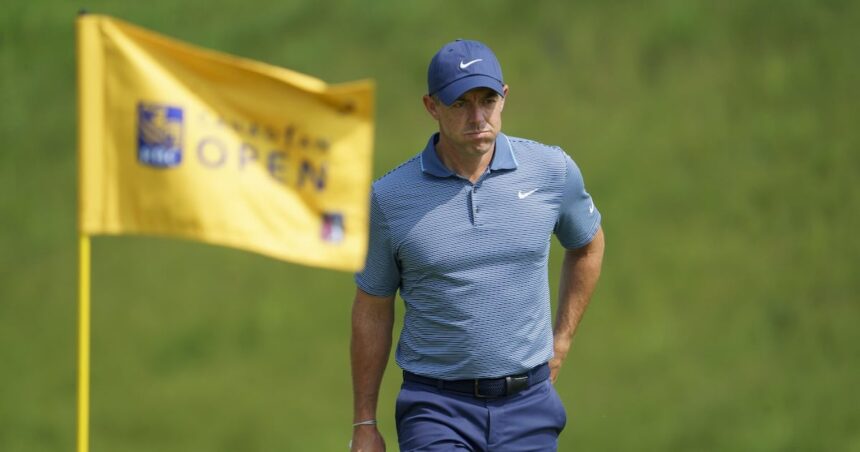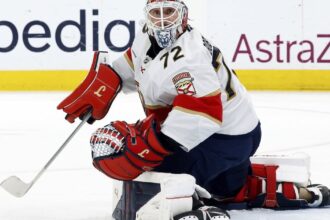The fairways of Hamilton Golf & Country Club fell silent—at least for Rory McIlroy’s supporters—as the Northern Irishman’s quest for a historic third consecutive Canadian Open title crumbled amid a disastrous second round on Friday. McIlroy, whose masterful command of Canadian courses had become something of a folklore in recent years, stumbled to a shocking 78, sending him packing before the weekend even began.
There’s a particular sting to watching a champion falter. McIlroy’s uncharacteristic collapse featured a card marred by six bogeys and a deflating double-bogey, leaving him at 5-over par—well outside the cut line. For spectators who had flocked to Hamilton hoping to witness another chapter in McIlroy’s Canadian love affair, the disappointment was palpable.
“Sometimes golf just doesn’t cooperate with your narrative,” McIlroy told reporters afterward, his usual confident demeanor subdued. “I felt disconnected from my swing all day. When that happens at this level, the course doesn’t forgive.”
As McIlroy departs, Cameron Champ has emerged as the weekend’s compelling storyline. The American with the aptly-named powerful drive has seized a two-shot lead at 10-under par after rounds of 66 and 68. Champ’s performance has been a masterclass in controlled aggression—finding fairways with his prodigious length and converting opportunities with a surprisingly delicate touch around the greens.
The RBC Canadian Open has always held a special place in our national sporting psyche. As Canada’s national championship and one of the oldest continuously running tournaments on the PGA Tour, it carries both historical weight and emotional resonance. Watching international stars battle on our soil connects us to the global sporting conversation while celebrating our own contributions to the game.
The tournament’s ebb and flow reflects broader cultural shifts in how we consume sports in 2025. The immediate hero-to-heartbreak narrative of McIlroy’s exit demonstrates the compressed emotional cycle modern fans experience—amplified through social media reactions and instant analysis.
What remains fascinating about golf is its stubborn resistance to predictability. Even in an era of advanced analytics, swing optimization software, and meticulously engineered equipment, the human element remains gloriously unquantifiable. McIlroy’s struggles remind us that excellence isn’t permanently attainable; it must be continuously earned.
The weekend now belongs to Champ and his pursuers. Canadian fans, though disappointed by McIlroy’s departure, have shifted their hopes to homegrown talent. Corey Conners, sitting five strokes back at 5-under, leads the Canadian contingent and carries realistic weekend hopes for becoming the first Canadian champion since Pat Fletcher in 1954.
“There’s something electric about playing at home,” Conners remarked after his steady second-round 69. “The support carries you through rough patches, and I’m feeling that energy heading into the weekend.”
The tournament’s concluding chapters promise compelling drama. Beyond the leaderboard battle, subplots abound: players fighting for FedEx Cup points, others seeking breakthrough performances, and veterans attempting to recapture former glory. Each competitor brings their own narrative to the final 36 holes.
Golf, perhaps more than any other sport, forces us to confront the fragility of excellence. Today’s hero can become tomorrow’s cautionary tale—and vice versa. As we witness the remaining field battle Hamilton’s challenges this weekend, we’re reminded that sport’s greatest gift is its unpredictability. It’s why we watch, discuss, and debate these moments long after the final putt drops.
For McIlroy, there will be other tournaments, other opportunities. For Champ and those chasing him, the Canadian Open presents an immediate chance to script their own memorable chapter. The beauty lies in not knowing exactly how the story ends.
























